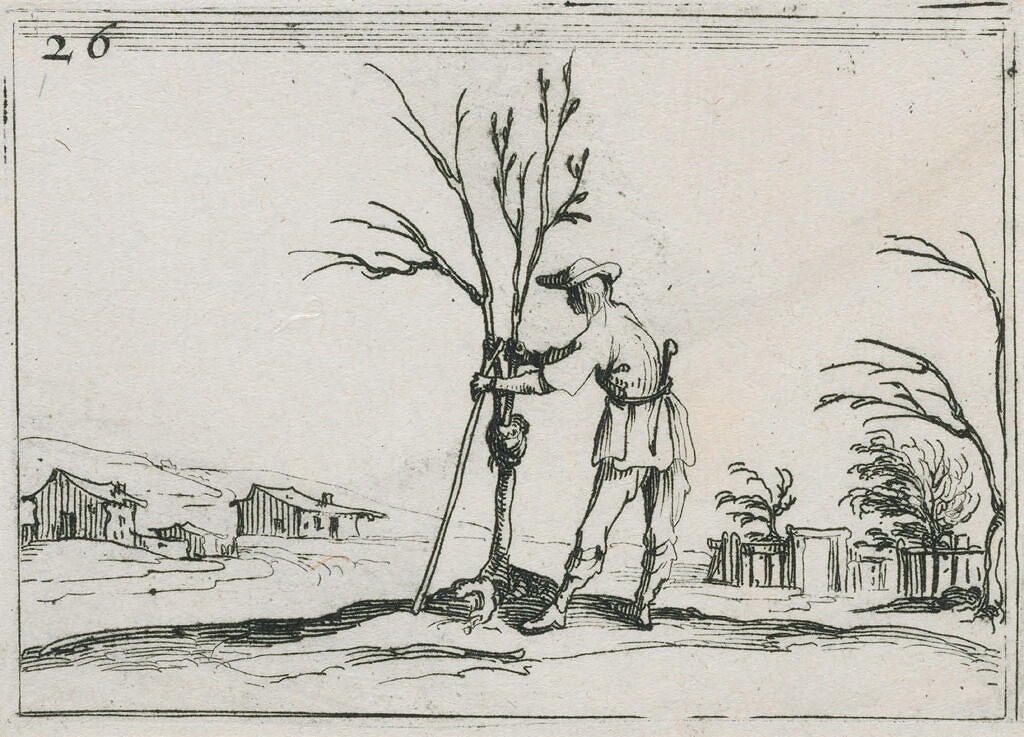Thinning

Jacques Callot: Gardener Pruning a Shrub (17th century)
"My garden tolerates my well-intended presence."
I think of gardening as a nurturing activity, though that description misrepresents the bulk of my effort. Much, if not most, of the time, I spend communing with nature there, defending myself against encroaching fertility rather than trying to encourage it. Sure, I maintain my compost heap, recycling every non-meat bit of kitchen waste back into superrich soil, but the plantings here hardly need any further encouragement. The soil, after more than twenty years of continuous improvement, has reached a level of self-sustainability. None of it will ever need much fertilizer or nurturing in my lifetime. Water whatever into the soil, and it will try to take over. Therefore, I spend most of my gardening time discouraging plants from taking over.
As with any garden, weeds prove to be the most prolific plants. These seed themselves, and many don't even seem to need water to thrive. In our yard, certain specimens sprout up in the same places year after year. I think of these as my Old Familiars. A mallow that always shows in precisely the exact location, even though I could swear that I took every inch of its more than foot-long root last year, about this time. There's a dandelion that's probably owned a corner of my front parking strip since the Late Jurassic Period. Each garden and bed in turn maintains its opposition to my cultivation, as if these beds would prefer to remain wild.
I do not maintain anything resembling a formal French garden. I let those weeds mature a little longer than I should, though I do try to catch them before they go to seed and start exponential expansion. I'm secretly glad for the green the juvenile weeds bring, even though I take personal affront to every weed's presence. The lawn probably should be considered a weed. It's the thirstiest part of the yard, and by far the neediest. It wants at least weekly attention. In high season, it wants mowing every scant few days. I'm continually weeding, too, for I love my freshly turned garden beds and have been in a running defense against the dreaded Cheat Grass rhizome since we arrived. The neighbors seem indifferent to it, so it continually creeps back in under the fences.
I prune hesitantly if at all. I usually leave the rose pruning to The Muse, who owns the roses by adverse possession and seems harder-hearted. A great gardener must maintain a hard heart, ready to sacrifice almost any plant or any limb for the sake of the larger garden or plant. I shy away from this sacred responsibility, often leaving our fruit trees unpruned when they best appreciate a cleansing pruning. I left my sacred apricot unpruned this Spring, and the tree has been threatening as a result. It repaid my misplaced kindness by sprouting a recond display of blossoms and consequently has over-loaded itself with budding green fruit. Limbs threateningly bend, so I spent time yesterday stripping unripe fruit away from them. This one tree can completely overwhelm me with its production, producing in a week more fruit than I'd need in a decade or more. We already have enough apricot preserves in the basement larder to last the rest of our lives. I worry about that tree losing limbs.
Stripping unripe fruit demands the coldest heart. It's pre-emptive surgery, but absolutely necessary. Had I properly pruned the tree back in February, this stripping would not have been essential. Alternatively, I could have taken a long pole and beat the blossoms off those limbs in early March, thereby reducing the volume of fruit set on those delicate limbs. Much of my extractive effort, including pruning, thinning, and weeding, stems from my deferred responsibility. Had I only taken fuller charge back then, I would not have needed to be precariously balancing upon the orchard ladder or crawling around the backyard pond chasing cheat grass rhizomes. Fecundity demands such tributes.
This world seems an extraordinarily fertile place and is in near constant need of discouragement to prevent it from overrunning its space. Those who deliberately jinn up trouble must have missed the memo. Trouble can escalate its own problems without any human intervention. Thinning seems the necessary and essential skill, heartlessness something other than cruel. Each gardener gets to pick and choose what qualifies as essential or disposable. Their responsibility extends far beyond mere nurturing. It's sobering for me to acknowledge that my garden doesn't need most of the intervention I require myself to provide it. I am nurturing myself there. My garden tolerates my well-intended presence.
©2025 by David A. Schmaltz - all rights reserved


